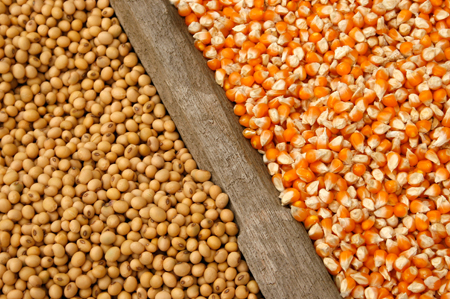Corn, Beans Little Changed Overnight; Egypt Looks to Replenish Domestic Supplies
 (Agriculture.com) – CORN, BEANS LITTLE CHANGED OVERNIGHT ON DEMAND VS. GLOBAL CROPS
(Agriculture.com) – CORN, BEANS LITTLE CHANGED OVERNIGHT ON DEMAND VS. GLOBAL CROPS
Corn and soybean futures were little changed in overnight trading as investors weighed potential demand against large global crops.
Sales of U.S. corn to overseas buyers since the start of the marketing year on Sept. 1 are up 51% year-over-year and soybean sales have risen 24% versus the same timeframe a year earlier, according to the Department of Agriculture.
Wheat sales since the start of the grain’s marketing year on June 1 are up 37% compared with the prior-year period, USDA data show.
Still, global production of all three crops is expected to be historically high this year, which is keeping a lid on prices.
Corn futures for May delivery rose a penny overnight to $3.56 ¾ a bushel.
Soybean futures added 1 ¾ cents to $9.73 ¼ a bushel. Soymeal rose $1.60 to $316.90 a short ton and soy oil lost 0.03 cent to 32.26 cents a pound.
Wheat futures for May delivery rose ¾ cent to $4.21 ½ a bushel in Chicago. Kansas City wheat gained a tick to $4.21 ½ a bushel.
GOOD NEWS FOR WHEAT GROWERS: EGYPT WANTS TO REPLENISH STOCKPILES
Egypt, the world’s biggest importer of wheat, said on Monday that the government wants to buy foreign grain during a period when it normally buys from domestic supplies in a bid to replenish inventories.
The North African country is forecast to import 11.8 million metric tons of wheat in the 2016-2017 marketing year, according to the U.S. Department of Agriculture.
The country’s General Authority for Supply Commodities (GASC) general will buy wheat from domestic stockpiles this time of year, but instead will buy from foreign supplies to ensure it has enough food to feed its population.
Egypt has allocated about $4.7 billion to food subsidies in 2017-2018, an increase in local currency terms from the prior year after the Egyptian pound lost more than half of its value in November, according to Reuters.
Food scarcity has been a problem in the region in the past, and initially sparked what is now known as the Arab Spring in 2010 and 2011.
During that event, which started in Tunisia in 2010 then spread to Egypt, Libya, and a host of nearby nations, protestors toppled governments and replaced leaders. Since then, government officials have been more conscious of ensuring food supplies.
SEVERE STORMS EXPECTED IN SOUTHERN PLAINS TO GIVE WAY TO CALM RAINS
Thunderstorms are expected to roll through the southern Plains starting today, bringing more much-needed rainfall to the region.
“Thunderstorms will be possible across all of the Oklahoma and Texas panhandles today and tonight,” the National Weather Service said in a forecast early Tuesday. “Some storms that develop will have the potential to become severe, with large hail and damaging winds being the primary hazards.”
More rain is expected Wednesday through Monday, though those storms are expected to be less severe, according to the NWS.
The weather maps are mostly quiet for the rest of the Plains and Midwest other than a few dense fog advisories this morning.




